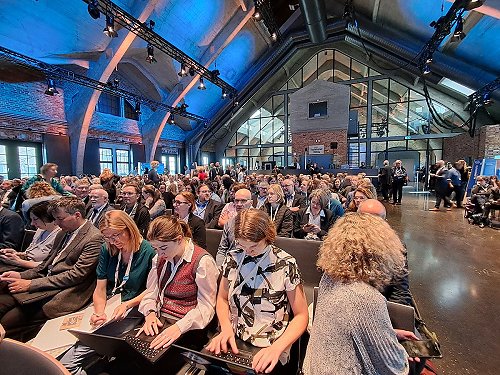 Planned long ahead to lead up to the UN Ocean Conference (UNOC3) a month later in Nice, France, the first ever German National Ocean Conference fell exactly into the unplanned moment of transition between governments. In the comfortable setting of the Berlin Westhafen event centre more than 400 participants followed the invitation to raise the profile of the ocean and marine protection in general. The political representation ranged from local mayors, representatives of the Länder, to the federal government and national agencies. A host of senior researchers and representatives of industry association was present alongside many participants from civil society and nature protection organisations.
Planned long ahead to lead up to the UN Ocean Conference (UNOC3) a month later in Nice, France, the first ever German National Ocean Conference fell exactly into the unplanned moment of transition between governments. In the comfortable setting of the Berlin Westhafen event centre more than 400 participants followed the invitation to raise the profile of the ocean and marine protection in general. The political representation ranged from local mayors, representatives of the Länder, to the federal government and national agencies. A host of senior researchers and representatives of industry association was present alongside many participants from civil society and nature protection organisations.
The first morning was dedicated to the political segment. Outgoing environment minister Steffi Lemke reviewed the many hotspots of nature protection she and her team worked on during her stint, both at national and international levels. While there is no shortage of on-going challenges on the agenda, such as the hopefully successful completion of the global binding plastic treaty to be achieved in Geneva during the summer, she mentioned a number of achievements that showed advances were possible even in the midst of adversities. She mentioned, among others:
- more protected and calmed areas in waters under national jurisdiction;
- €3.5 billion allocated for the rehabilitation of CO2 sinks, incl. financial means for the marine protection fund (Meeresschutzfonds) from the auctioning of offshore wind permits;
- mapping the 1.3 million tons of ammunition sunk into the Baltic after WWII and testing safe discharge for scale-up in order to eliminate this threat for people, ecosystems and installations;
- the agreement of the International Maritime Organization (IMO) for an agenda for reduced emissions until 2050;
build-up of a front of 32 national governments arguing for a moratorium on deep sea mining in the context of the International Seabed Authority (ISA), a position also maintained by the parties forming the new government.
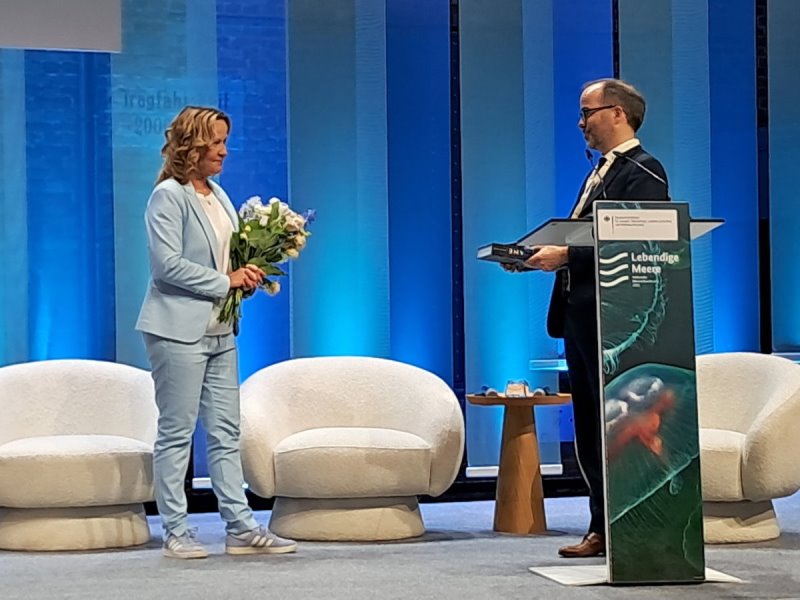
Outgoing Environment Minister, Steffi Lemke, receives flowers from Special Envoy for Marine Protection, Sebastian Unger
She also sketched the unfinished business with such key items as:
- a general move out of fossil fuels towards renewable sources of energy with a particular emphasis on a stop of petroleum and gas production in environmentally sensitive areas;
- underscoring the importance of ocean and nature protection as a key element for security;
- while the ratification of the High Seas BBNJ Treaty was not possible in time for UNOC3 because of the change in the legislature, the incoming government has already signalled to advance ratification as a matter of priority.
Lemke got a long applause for he steadfast work as environment minister and a recognition of the equally esteemed Sebastian Unger, her special envoy for marine protection.
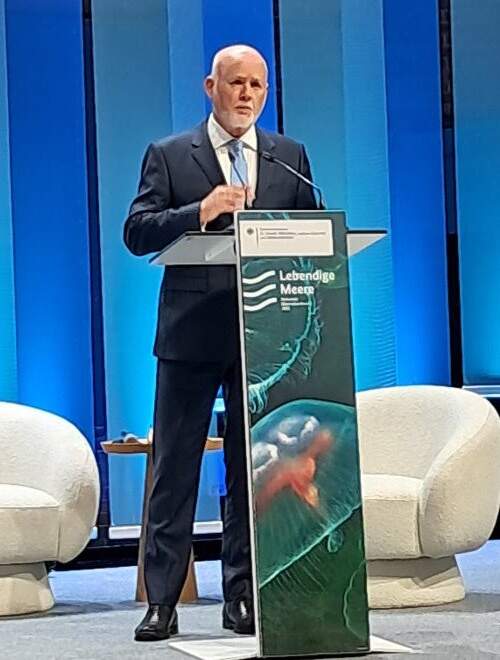
Ambassador Peter Thomson from Fiji, Special Envoy for the Ocean of the UN Secretary General
Ambassador Peter Thomson, Special Envoy for the Ocean of UN Secretary General Guterres, underlined the urgency of ratifying the BBNJ Treaty and the need for operational plans on how to implement the 30×30 commitment – protecting 30% of the ocean by 2030. These plans can not wait until the formal entry into force of the treaty. Work on implementing the agreement must gain momentum fast. There is enough science-based information on how to move forward according to the Honiara Summit for delivering on Sustainable Development Goal 14 (SDG14), the most under-funded of all SDGs: Stop harmful fisheries subsidies, protect the more than 70% resources from further overfishing and rebuild life in the sea, increase the use of renewable sources of energy.
Instead of a course towards 4°C warming and even more dramatic climate disruption, we are on a trajectory for 2.6°C temperature increase at the moment. But we still require much more efforts to reduce emissions, reduce materials circulation and give more space to life on the planet. This is essential for stopping the ongoing massive coral bleaching and death. It is equally essential for the 900 million humans living in coastal areas acutely affected by sea level rise that is happening faster than anticipated.
What are the top three items on the action agenda? Sea level rise, funding for SDG14, and sustained effort to provide the science in sufficient resolution for policy and action.
He closed with hoping that the incoming government would play as strong a role in international ocean and nature protection that was the case so far. It mattered immensely to maintain the thrust of multilateral cooperation. On the road to UNOC4 jointly organised by Korea and Chile in Korea in 2027 there was much work to do for translating talk into action.
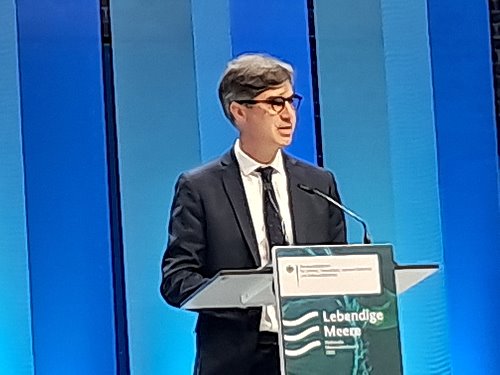
Charles Tellier, Deputy Ocean Envoy, France
Charles Tellier, Deputy Ocean Envoy of France, emphasised the high political attention ocean matters were now attracting. The focus was to operationalise commitments and have UNOC3 as the high point of the BBNJ Treaty entering into force with 60 ratifications. He highlighted the pact of between 250 to 300 local mayors representing millions of people working towards implementation. Key elements were, e.g. local knowledge backed by science, finding new solutions that benefited people and nature and an end to plastic pollution and fossil fuels.
Three half days helped to address multi-faceted topics in plenary and ‘deep dive’ workshops into the following themes:
- Strongly protected marine areas
- Healthy and clean seas
- Knowledge for healthy seas
- Blue economy in tune with nature
- Strong voice for marine protection.
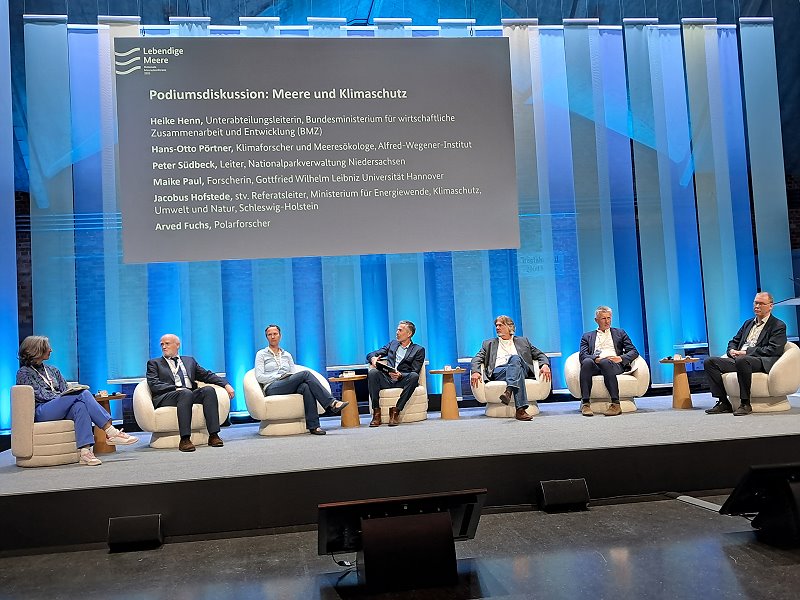
Panel Ocean and climate protection
Perhaps the most striking take-away beyond good networking and experience exchanges was the need for accelerated action. Time and again, one could observe, the general will was there, the information was available, technologies and institutional organisational capacities were in place.
Yet, very little was actually moving forward despite all the declarations from almost across the board. How come, a LNG terminal is approved and set up in record time in the National Waddensee Park, while some opened a new discussion about killing cormorants and seals who eat ‘our fish’?
The sobering voice of Arved Fuchs, a polar researchers living and working in the cold regions since more than 40 years on his century-old sail boat, warrants attention. He dryly noted that his trecking to the North Pole on foot a few decades back was simply not possible any more, because so much of the ice has melted meanwhile as the Arctic was warming several times faster than other regions.
Homo sapiens, just one species, claims already more than 30% of all energy and material production of the planet for itself and pushes other life forms more and more towards extinction. Does that make you think? Already the quantity of human artefacts exceed the total weight of plant and animal life on the planet [1]. Join the action and push governments at all levels to keep us all out of harm’s way! Not only in Germany. And put in place the structural measures needed to stop overconsumption as a condition for people everywhere meeting their basic needs. With cooperation at all levels and shared stewardship we can implement SDG 14 and the entire Agenda 2030.
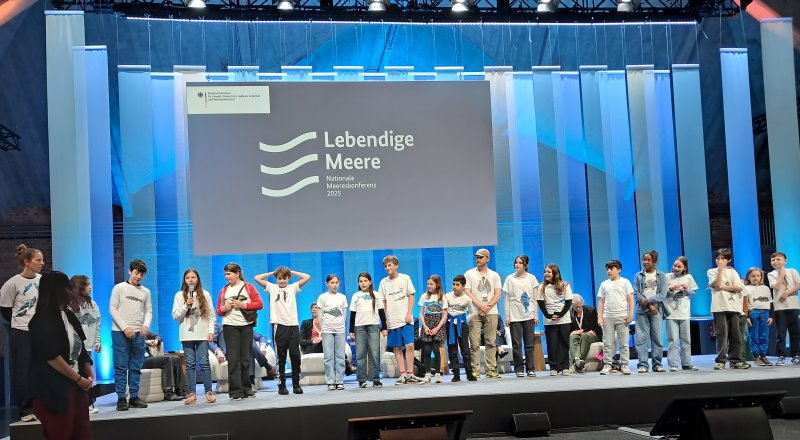
Pupils engaged in an art project for ocean protection demanded action, fast.
Brief summary by Cornelia Nauen, who participated on behalf of Mundus maris asbl.
[1] Elhacham, E., Ben-Uri, L., Grozovski, J. et al. Global human-made mass exceeds all living biomass. Nature 588, 442–444 (2020). https://doi.org/10.1038/s41586-020-3010-5
